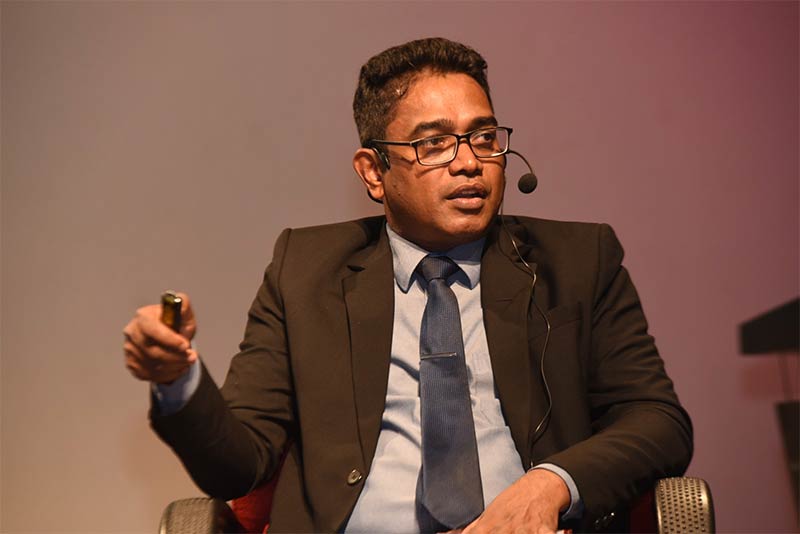Sunday Feb 22, 2026
Sunday Feb 22, 2026
Wednesday, 10 September 2025 03:49 - - {{hitsCtrl.values.hits}}

Tax Consultant Prabath Weerasinghe
Tax Consultant Prabath Weerasinghe recently warned that Sri Lanka’s apparel industry risks falling further behind competitors like Bangladesh, Vietnam, and Cambodia, with weak labour productivity, limited innovation, and mounting tariff pressures squeezing margins.
Addressing the ‘CEO Forum 2025: Economic Impact on New US Tariffs’ organised by the Open University of Sri Lanka’s Faculty of Management Studies CEMBA/CEMPA Alumni Association, Weerasinghe, who specialises in the apparel sector, said the structure of the industry makes it particularly vulnerable to external shocks.
Most manufacturers operate on a subcontracting basis, while only a handful of larger firms handle exports directly, he said, adding that many apparel groups have set up trading houses in countries such as India and Bangladesh, with production remaining in Sri Lanka but sales transactions routed abroad.
Weerasinghe pointed out that the economy has yet to resolve underlying problems of unemployment and the recent economic crisis, with apparel exports still dependent on a few markets, notably the US and preferential access under the EU’s GSP+ scheme.
“The UK market remains largely unexplored, and with new regulations in place, competition will be high,” he said. Concerns over human rights also weigh on access to Western markets, adding to industry uncertainty.
Volatility in exchange rates, tight liquidity, and inflation compound these pressures. Some overseas buyers are reluctant to accept letters of credit issued by Sri Lankan banks, reflecting concerns over creditworthiness.
“Rising wages following the Government’s introduction of a minimum salary scale have added to costs, while post-pandemic closures of factories in industrial zones continue to affect capacity. Many exporters now finance raw material imports through overseas facilities due to high domestic interest rates,” Weerasinghe said.
While Sri Lanka’s corporate tax rates are nominally competitive compared with Vietnam and India, Weerasinghe noted that efficiency and productivity remain weak. “Labour productivity is higher in Bangladesh, Vietnam, and Cambodia, while innovation and R&D are lagging in Sri Lanka,” he said.
Tariff negotiations with the US have also increased pressure, with buyers demanding price cuts of up to 25%. Margins are already thin, and raw material and energy costs remain elevated due to global disruptions ranging from the Russia-Ukraine conflict to US-China tensions.
He stressed that avoiding malpractice in rules of origin is critical, as transshipment risks could see duties spike to 40 percent. “Exporters must improve operational efficiency, cut costs, and diversify into new markets through trade agreements. The Government has to take a more active role in building competitiveness, supporting compliance, and encouraging innovation,” Weerasinghe said.
Pic by Shehan Gunasekara